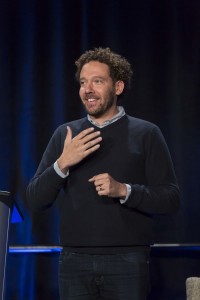WASHINGTON, D.C.: For all their timeliness and immediacy, Theatre Communications Group plenaries are not typically places where breaking world news gets delivered. But such is the state of the world in this jolting year that events have a way intruding on even the most placid conversations. Which is why the merest mention of Brexit, the momentous decision of a slim majority of Britons to leave the European Union less than 24 hours before Friday afternoon’s TCG plenary, during a chat between Tony-winning playwright Stephen Karam and Obie-winning playwright Nikkole Salter, prompted a somewhat bewildering commotion among the audience, which included a number of theatremakers from the not-so-United-Kingdom. Karam and Salter were momentarily confused, thinking that it was perhaps the sound of Brexit supporters cheering. But it soon became clear that U.K. representatives were attempting to call out another dramatic and distressing bit of news from across the pond: that British Prime Minister David Cameron had just resigned in protest.
As TCG executive director Teresa Eyring noted at the opening plenary, the planned theme “Theatre Nation” was chosen for the conference well before it became clear what connotations “nation” would take on in this singularly unsettling moment, from a rancorous debate about immigration and borders in the U.S. to the apparent, and not entirely unrelated, resurgence of nationalism in Europe. Marking its own, slightly more peaceful changing of the guard, the TCG plenary began with the conference’s first mention of the British referendum vote, which departing board chair Diane Rodriguez wrapped into a larger statement about the role of the arts on the global stage. “The world is changing, and we need leaders who will change with it,” she said, adding, “The world needs theatre and we need the world.”
Incoming board chair Kevin Moriarty, Dallas Theater Center‘s artistic director, sounded a bullish note. “Our field faces challenges but even more opportunities,” Moriarty said, listing his priorities as “encouraging innovation, creating theatre not only for but of and with the communities where we create our art,” as well as making sure that theatre is “adequately capitalized to make the art and to compensate artists and administrators equitably.” He closed with a kind of motto: “None of you is alone. We are a theatre nation.”
Giving a powerful illustration of both the challenges and opportunities facing the field was the screening of the powerful video “Beyond Orientalism,” which also anchored a recent forum in New York City. Created by Nelson Eusebio, Angel Desai, and Siho Ellsmore, with support from Asian American Arts Alliance, Asian American Performers Action Coalition (AAPAC), Alliance for Inclusion in the Arts, and the Smithsonian Asian Pacific American Center, as well as TCG, the video highlights the ways that stage and film have hideously stereotyped, lampooned, and effectively erased Asian and Pacific Islander, as well as South Asian, characters and actors, then closes with a stunning gallery of roles and images that are beginning to accrue, which show more rounded, more authentic, and more integral depictions of Asian Americans.
Echoing a theme that was heard in many breakout sessions throughout the day, Elena Chang, TCG’s associate director of Equity, Diversity, and Inclusion, spoke to the role that privileged allies can play in combating racial injustice. “If you see an instance of misappropriation, mention it,” said Chang, “especially if you’re not Asian-American.”
Next on the agenda was the presentation of the Peter Zeisler Award for artistic ingenuity and integrity. Bill O’Brien, now senior innovation adviser to NEA chairman Jane Chu, spoke glowingly of his years working with L.A.’s Deaf West Theatre as he presented the Zeisler award to Deaf West’s current artistic director, D.J. Kurs. “I need to make it clear that I’m not giving this award in my official capacity at the NEA,” said O’Brien. “I’m here as one of the million people or so who have experienced a Deaf West show and found it to be absolutely life-changing.”

In an acceptance speech greeted with the signature Deaf applause of raised waving hands, Kurs spoke of the way the craft of translation and interpretation makes Deaf theatre an exciting aesthetic frontier for both Deaf and hearing artists. Or, as he put it, “Increased inclusion propels our craft towards new creative heights.”
The afternoon concluded with a cozy dialogue between playwrights Salter and Karam, who compared notes about inspiration, frustration, and the unexpected impact of their work. While Salter said she often feels “plagued by ideas,” and that her work is “always very issue-driven, about something that makes me mad or sad,” Karam said that his plays spring from the very personal fears “that keep him up at night” and end up touching on larger social issues. His current Broadway hit The Humans, for instance, has inspired a lot of political commentary about its portrayal of the “disappearance of the middle class”—a phenomenon Karam wouldn’t deny is happening, but which was not explicitly on his mind when he began to write.
It was a short distance from the mention of politics to a full-blown two-way therapy session about the state of the world and the current U.S. political climate in the wake of the Orlando massacre and a certain toxic presidential campaign.
“It’s every artist’s job to tell the truth–exploring the human condition, I feel it’s my responsibility,” said Karam. “It’s hard to tell the truth. It means being connected to those around me, and aware of what’s going on in the world. But reading the news, a certain despondency can set in.”
“It feels almost like a play,” said Salter of the often incredible twists and turns of current events. “But if I wrote it, no one would produce it.”


